Rethinking Waste – Music Festival Edition
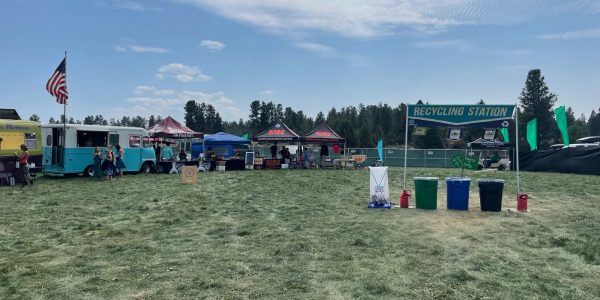
Earlier this month, our team partnered with Mini 4 Peaks to Rethink Waste – music festival edition. In collaboration with festival organizers and vendors, we worked to eliminate single use food packaging, set up ample waste sorting stations with educational signage, and coordinated a volunteer recycling crew. The result: 61% of waste diverted from the Knott Landfill to recycling and composting across 4 days of 600+ people camping and playing. To give you some context, the diversion rate across Deschutes County is currently 33%, with a goal of reaching 45% by 2025.
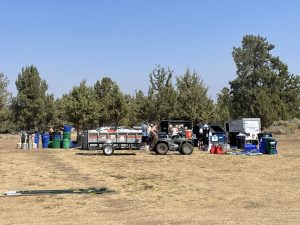
With the return of larger outdoor events on the horizon, we have an opportunity to shift away from waste-generating festival models to Rethink Waste.
I sat down with Jackie Wilson, The Environmental Center (TEC) lead on this partnership, to gather some lessons learned from this kind of partnership and share some tips for future festival organizers and attendees.
Q: 61% waste diverted from landfill to recycling and composting is pretty impressive, especially for a music festival. Festivals typically have a reputation for producing a lot of waste. Can you describe for our readers, how we determine a diversion rate?
A: We determine a diversion rate by adding up the total number of waste streams. In the case of 4 Peaks, we had garbage, redeemable bottles and cans, composting, glass bottles, and commingled recycling. Once we gather a total number, we divide the number of recycling and compost that was put in a place other than the landfill. At this event, only the green team/recycling crew has access to the dumpsters, which really helped us with reducing the contamination rate. The volunteers are educated on our bin system and are really passionate to help keep things looking good, with the right materials in the right bins.

Q: How did this festival look different from others? What did you, vendors, organizers, and volunteers do differently that set festival goers up for success?
A: The motto “keep it classy” really helped remind festival goers that it takes us all to make the difference. The organizer, Stacy, did a great job while MC’ing. She reminded folks to use the recycling center and pick up after themselves. I know they really wanted to allow folks to use their own cups to reduce the impact further. With COVID, we had to go with one-time use at the bar and with food vendors. In the future, I know we would love to adopt something similar to Pickathon where there is washable ware for drinks and food, reducing the impact even more. Even at the end, for clean-up, I had several folks leaving, find me to apologize about a tent or pop up that broke. They wanted to make sure they did not just leave it, but dispose of it. Keeping it Classy. I think that consistent message and the local community really helped make it a success.
Q: Can you give us some insight into how it all came together? I understand you serve as a resource for organizers and vendors making intentional decisions about products and services. Can you give us a glimpse into some of the organizing prior to the event?
A: 4 Peaks has been partnering with TEC since the Rethink Waste Project (RWP) took off. We started with general education and support. When we purchased the RWP recycling stations, we provided them for the festival as we do for other events. The bins still got contaminated as some of the provided bins look very similar. Five years ago, the festival took on some new volunteer software and requested us to help take on more of a role in managing volunteers to increase the rates of recycling and diversion, because it was important for the festival, to Stacy and for our community.
Before the event, we help get an order in with the hauler, set up pick up and delivery, and ensure there is enough signage for the event. We reach out to all food vendors to make sure they understand they need to bring compostable food ware. We also provide them with a container for food scraps. 3 years ago, the hauler recommended 4 Peaks purchase their own containers to save money. We had an opportunity then to really color code our waste stations with RWP marketing and class it up. The week of the festival, we bring supplies and work with an amazing crew of volunteers to set up stations throughout the festival and campgrounds. It is amazing what is accomplished with a great crew and some Rethink Waste planning.
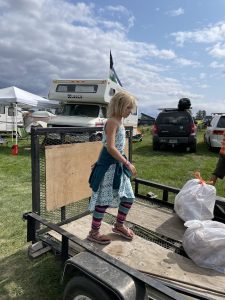
Q: Now that we have a sense of what it takes behind the scenes, what are your top tips for festival goers to reduce their waste and correctly sort recycling and composting?
A: We send out “know before you go” information to the ticket holders. We share tips for packing food and camping to reduce waste, as well as the ins and outs of recycling. We also shared this information with all the food vendors to assist them in reducing their impact.
Q: Anything else you’d like to share?
A: I love the idea of this being scaled up to local events like Munch and Music, events at Les Schwab, and more. It is important we, the Bend Community, make an effort everywhere in our community to reduce our impact where possible. It takes a little commitment, education and some great volunteers. Imagine if every event in Bend had at least a 50% diversion rate!
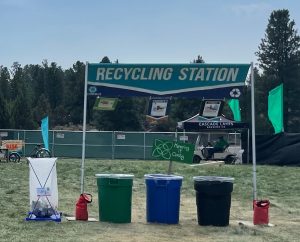
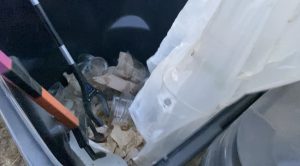
I got a behind the scenes look at waste diversion in action while serving on the green team/recycling crew. From a Rethink Waste outreach perspective, the signage and sorting support provide hands-on learning experiences for proper recycling or composting. Attendees can take this information back home to put waste diversion into practice across Deschutes County. I look forward to opportunities for providing these resources at events throughout our community!
Interested in connecting with Rethink Waste Project for the next event you are hosting or attending? Check out our tips for hosting a zero waste event or contact udara AT envirocenter.org